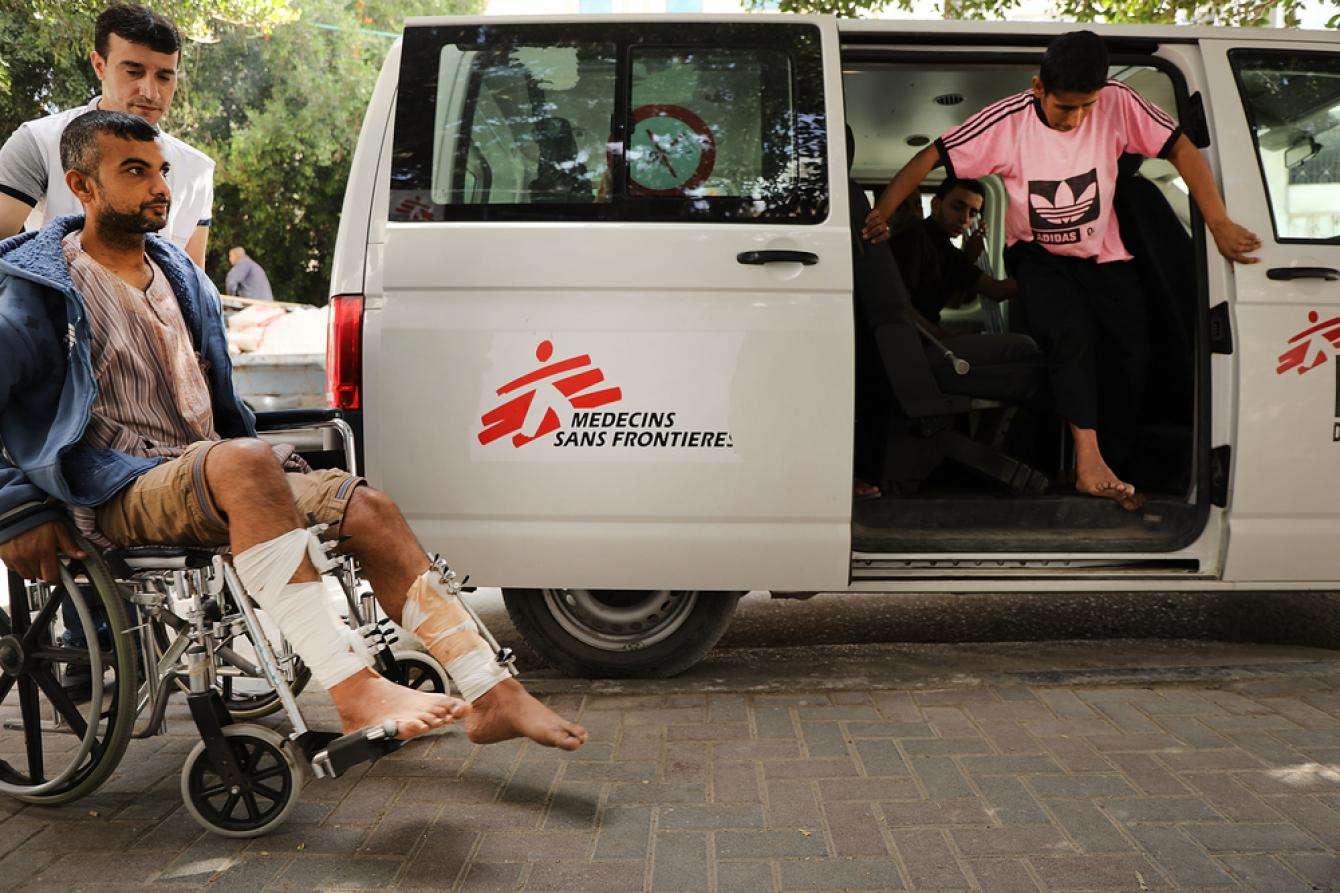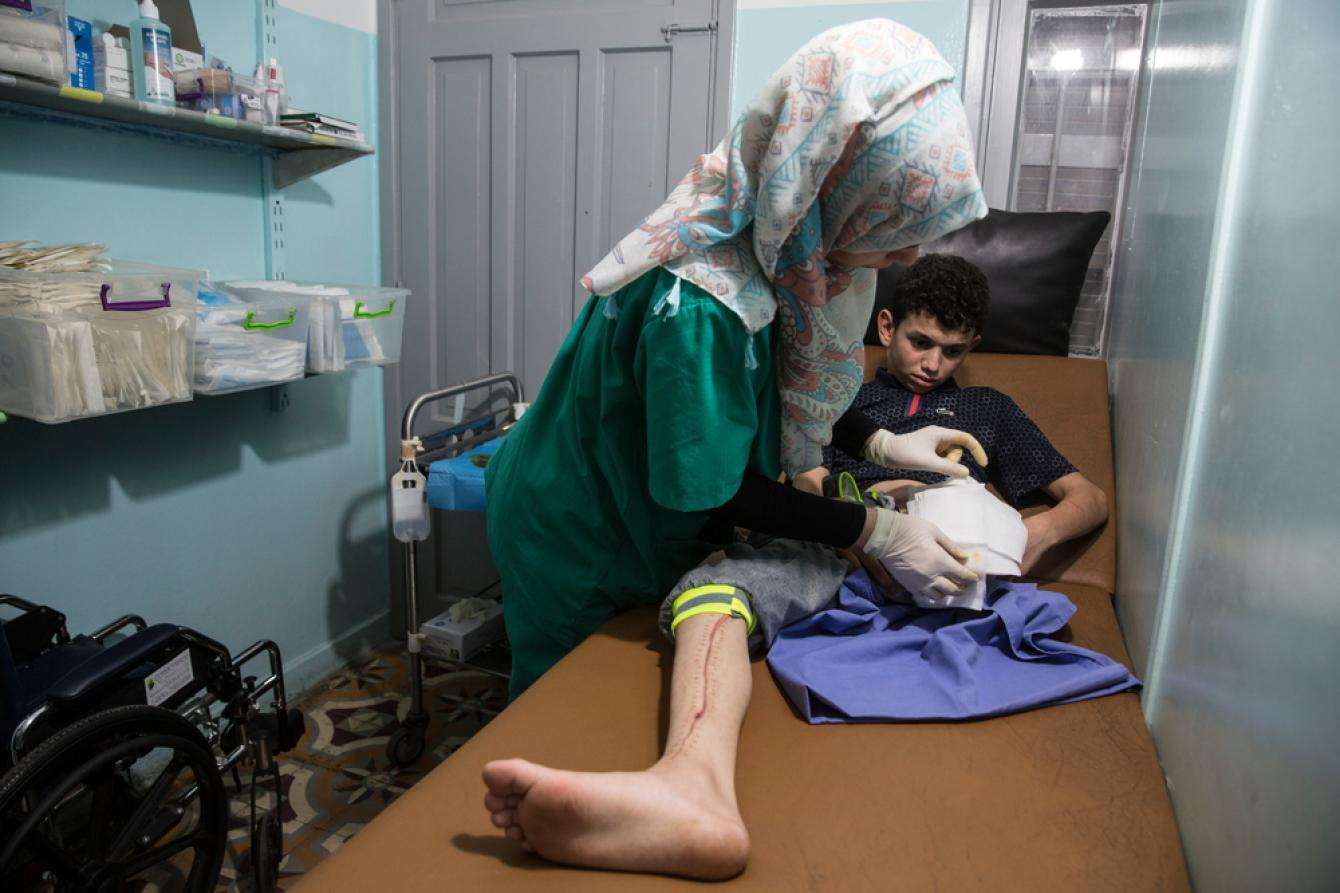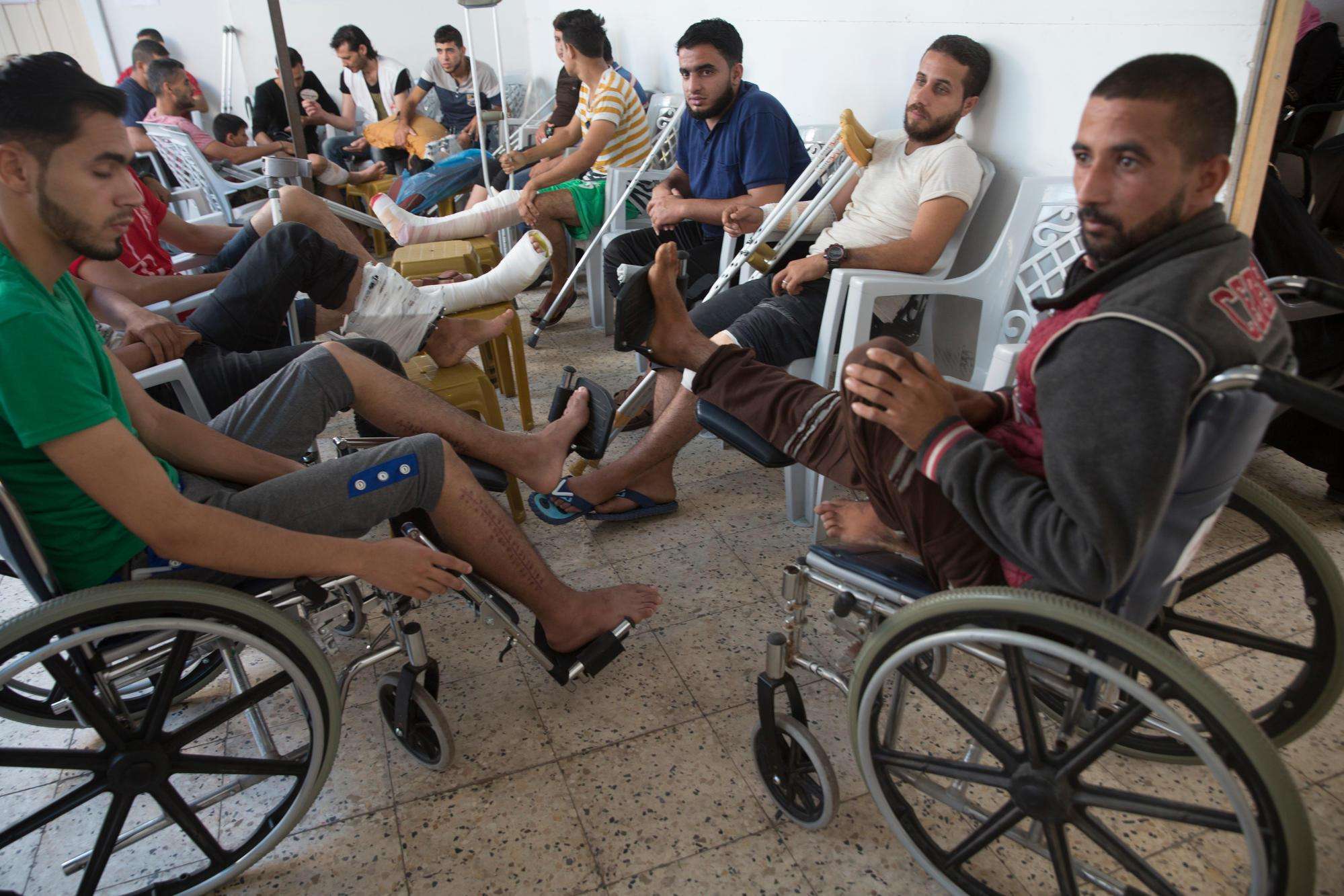For the past four months, the March of Return demonstrations in Gaza have been met with lethal force by the Israeli army. While protests and casualties have now decreased, the violence is not over—fresh gunshot wounds occur every week. New violence in recent weeks has resulted in the death of one Israeli soldier in mid-July and continuing deaths and injuries among Palestinians.
Doctors Without Borders/Médecins Sans Frontières (MSF) has been heavily involved in the emergency response since the beginning with both surgical and post-operative care. The biggest challenge today is treating a massive number of patients with extreme, life-changing injuries that require advanced medical intervention.
In the operating room at Friendship Hospital in Gaza City, two MSF doctors, Camille Rodaix and Jan Wynands, struggled with a patient’s shin that had been shattered by a bullet—the bone was shredded and a big chunk of flesh blown away. The plan had been to take some healthy muscle from the calf to help fill the wound. However, once they opened the calf they found the muscle was also damaged: riddled with bits of shrapnel and toughened by areas of scar tissue.
“I operated on this patient before to remove a bone fragment that was sticking up into the skin,” said Dr. Rodaix, an orthopedic surgeon. “I will work with Jan—the plastic surgeon—to check for any remaining bits of dead bone and to close the wound.”
Though this was not the patient’s first operation, it would also not be his last: the orthopedic surgery necessary to permanently heal the wound is extremely difficult, according to Dr. Rodaix. “We don’t have the tools to do it, and we cannot try to fix the bone while the wound is still open anyway,” she said.

Since the end of March, the “Great March of Return” protests have seen over 150 Palestinians shot dead by the Israeli army, as well as over 4,100 injured by bullets. MSF has treated over 1,700 patients, nearly all of them with gunshot wounds like this one.
Many of these wounds were caused on Fridays over the last four months, which is when most protests and Israeli military responses have taken place at the fence surrounding the Gaza Strip. MSF is still receiving new patients as the violence has not stopped, although it is now happening on a smaller scale. Still, hundreds of Palestinian protesters are wounded every week at the fence, and a few are killed.
“The injuries that we see are characterized by a high prevalence of open fractures—most below the knee—with massive tissue loss, which means damage to the veins and nerves as well,” said Marie-Elisabeth Ingres, MSF’s head of mission. “Many of these patients require multiple surgeries just to close the wound.”
With a health system crippled by ten years of Israeli and Egyptian blockades and Palestinian political infighting, the specialized surgeries that many of these patients need are unavailable, raising the specter that they will be disabled for life.
A new normal
Each morning at five clinics in the Gaza Strip a succession of MSF vans pulls up and discharges waves of young men, awkwardly slinging themselves out of the vehicles while holding legs forced straight by a tangle of metal. They pick their crutches from the pile that has tumbled together and propel themselves through the doors. Inside, rows of patients wait to be seen, their external fixators—a metal rod attached at right angles to pins drilled into the remaining parts of the bone—sticking through tracksuit bottoms stitched with Velcro flaps, allowing their trousers to come on and off, without disturbing the pins stuck into the bone beneath.
In these clinics MSF is changing dressings and providing physiotherapy on a scale that reflects the staggering quantity and severity of the injuries. Since March 30, MSF has carried out over 40,000 appointments to change dressings for trauma patients, helping those who can to recover and keeping an eye on people whose injuries means they require further surgery.

“I didn’t feel anything at first when I got shot,” said Raed Bordini, 24, from al Maghazi camp. “There was just a flash of something like electricity, I sat down suddenly and found I couldn’t move. I was trying to pull myself back, but I couldn’t. I was bleeding a lot, and I was scared of the effects on my leg because it was all open—cut open from the back to the front.”
Bordini comes to the clinic multiple times a week for dressing changes with his external fixator still in. “I am in a lot of pain,” he said. “I take a lot of things like ibuprofen and paracetamol, but it has no effect. I am scared the function won’t return to my leg.”
Dawlet Hamidiyyeh, 33, is one of the few female patients MSF treats for gunshot wounds. She attends the Beit Lahia clinic in a wheelchair, her leg stuck out straight in front of her.
“It was the first time I went to the fence,” she said of May 14, the deadliest day of protests. “I wanted to see what was happening. I brought some water and perfume for the effects of the gas. After I was shot I was taken to the Indonesian hospital, my eyes were open, but I couldn’t see. However, I could hear everything. The people thought I was dead. They put me in the morgue at the hospital, but after ten minutes one of the doctors noticed I was alive and started shouting that I had a pulse.”
Now she comes to the clinic three times a week to have her dressings changed. Her external fixator needs to be kept in place for at least five months. “I’m scared that I won’t be like before, that I won’t be able to walk.”
A second wave of amputations
Unfortunately, the worries of many patients like Bordini and Hamidiyyeh are justified. “We will probably see a second wave of amputations,” said Pascale Marty, MSF’s medical team leader in Gaza. “Gunshot wounds are by definition contaminated wounds because the bullet has entered the wound, meaning that there is a high prevalence of infection.” Infected open fractures of such complexity pose a threat to the life of the patient, leaving little choice but to amputate if reconstructive surgery is not an option.

While such severe wounds and high rates of infection would usually require the wounded to be hospitalized, the overburdened health system in Gaza cannot accommodate such a high number of patients.
Mohammed Abu Gaza, 25, was shot on April 6 near Rafah. His knee shattered, but he was repeatedly discharged from the hospital.
“Six days after I was shot I was discharged to make space for the wounded,” he said. “I kept going back to the hospital with fever and pain, but they wouldn’t admit me, because they were full.”
After being referred by MSF to a different hospital, he had another operation but eventually, the same thing happened: “I stayed one week there, but then they discharged me again to make way for the next wave of wounded.”
An economic burden
The effects of wounds like these are rippling throughout Gaza, burdening the wider society with the costs and responsibilities of care, in a place where years of occupation, war, internecine conflict and political infighting, and blockade, have brought the economy to the brink of collapse.
Unemployment among the 15-29 age group—which makes up two-thirds of MSF’s patients—has reached 60 percent, according to the World Bank. If patients previously earned wages, in many cases, their families have now lost the support that their income provided and are bearing the extra burden of their care.
“Before I was injured I sometimes sold vegetables from a cart in the market, but it was only enough to bring me money for cigarettes,” said Abu Gaza. “Now I just sit in the house—I can’t do anything by myself, even washing. I have to ask the family for help with everything.” Another patient who was shot on March 30, described how his father, a government employee, had to borrow $1,500 from relatives to pay for the treatment he needed. “Before, sometimes I worked with my friends and relatives on building sites," he said. "I really miss this. I am not able to earn money now. My relatives abroad are sending money for my treatment.”
Mental health consequences
The consequences are not just economic, however. As well as being a hairdresser, Hamidiyyeh was a caregiver for her sick father. “It hurts me that I can’t help my dad,” she said. “Now I need care as well as him.” The accumulation of physical pain, financial stress, and social pressures is causing mental difficulties for many of the patients. “It’s hard—24 hours a day, I’m just sitting in the house. Honestly, it’s destroyed my life, and the life of my family,” Hamidiyyeh said, downcast.
Over two months have passed since the days of the heaviest casualties, a period that would see normal fractures heal. For many of those in Gaza, progress has not nearly been so quick, due to the complexity of their injuries. “They will need five to six months to heal, if they heal at all,” said Dr. Rodaix. “Our patients can be divided into three groups of roughly equal sizes: those who will eventually heal, those who will need extra surgeries to heal, and those who will need specialized reconstructive surgery over the course of years if they are to have any chance of healing.” This type of surgery is unavailable in Gaza, however, leaving many people facing the possibility that they will never regain the function of their limbs.
Back at Friendship Hospital, Drs. Rodaix and Wynands have succeeded in pulling across the section of muscle they needed to fill the wound after some tense moments. A section of the skin from the thigh had been grafted onto the wound to close it, and the team started to relax as the long hours of surgery came to an end. “This operation was representative of the fact that you think, ‘this is not so bad’,” said Dr. Rodaix, “but the wounds are so bad here that you never know what you will find inside.” She was hopeful that the patient would manage to avoid further infection with the wound closed. However, for him and many others, with bones missing and the blockade in place, the long-term future is far from certain.




